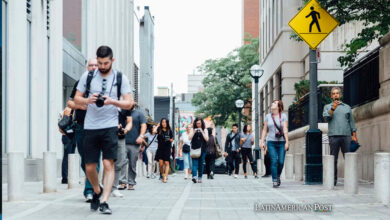Obese BME people at ‘higher-risk’ of contracting COVID-19
Obese people among black and minority ethnic communities (BME) are at around two times higher the risk of contracting COVID-19.

Obese people among black communities are more likely to contract coronavirus. / Photo: Unsplash
EurekAlert | National Institute for Health Research
Listen to this article
Leer en español: ¿La obesidad está relacionada con mayor riesgo de contraer COVID-19?
Obese people among black and minority ethnic communities (BME) are at around two times higher the risk of contracting COVID-19 than white Europeans, a study conducted by a team of Leicester researchers has found.
Previous research has shown that ethnicity can alter the association between the body mass index (BMI) and cardiometabolic health so the researchers wanted to explore whether a person's weight could change the relative risk of COVID-19 across ethnic groups.
Emerging COVID-19 evidence has found that South Asian and black, African or Caribbean populations are at a higher risk of becoming seriously unwell with the condition. In addition, a link with obesity has also been found.
The research team drew expertise from the University of Leicester's Diabetes Research Centre, the National Institute for Health Research (NIHR) Leicester Biomedical Research Centre (BRC) and the NIHR Applied Research Collaboration (ARC) East Midlands.
The researchers accessed the UK Biobank – a national database of more than 500,000 people who had their health information recorded between March 2006 and July 2010. These individuals had their health records cross-referenced to a national COVID-19 laboratory test data bank between the period of March 16 and June 14, 2020. Of that cohort, 5,623 unique test results were available.
The information helped the research team to quantify the association of BMI with the risk of a positive test for COVID-19, broken down by ethnic group.
According to the results, the greater risk of COVID-19 in BME people relative to white Europeans was only apparent at higher BMI values. For example, at a BMI value of 25 kg/m2, there was no difference in risk, whereas at a BMI of 30 kg/m2 the risk of COVID-19 was nearly twice as high (1.75) and at 35 kg/m2 more than two and a half times higher (2.76) in BME individuals relative to white Europeans.
Cameron Razieh, a PhD student at the University of Leicester, concluded: "Although limited by non-random testing for COVID-19 within the UK, this data suggests that the association between BMI and the risk of COVID-19 may vary by ethnicity and acts as an important effect modifier for the increased risk of COVID-19 in BME populations. These results suggest that the combination of obesity and BME status may place individuals at particularly high-risk of contracting COVID-19, which is consistent with findings for associations of BMI and ethnicity with cardiometabolic dysfunction."
One of the researchers, Professor Kamlesh Khunti, Director of ARC East Midlands and Professor of Primary Care, Diabetes and Vascular Medicine at the University of Leicester, said: "COVID-19 has caused so much death and misery, devastated global economies and put unprecedented strain on clinical services, but despite the worldwide impact this virus has had, we still know very little about it."
Also read: Global threats: How lessons from COVID-19 can prevent environmental meltdown
"There's still so much we need to understand about the condition, but our latest findings suggest the association between BMI and the risk of COVID-19 may vary by ethnicity."
"That means the combination of obesity and BME status may place individuals at a significantly higher-risk of contracting COVID-19, which is consistent with other studies that have previously linked BMI and ethnicity with cardiometabolic dysfunction."
Co- lead author, Professor Thomas Yates, Professor of Physical Activity and Health at the University of Leicester, said: "The role of obesity as risk factor for chronic disease is well established, however we need more research to understand its role as a risk factor for the COVID-19 pandemic and how this affects different populations."
Another of the authors, Professor Melanie Davies CBE, Professor of Diabetes Medicine at the University of Leicester, who is also the Director of the Leicester BRC, said: "Knowledge is power and if we are to have any hope of beating this pandemic, we need to gain as much information about COVID-19 as we possibly can."
"Our research has given us more insight into who is at more risk from being infected and we now need to come together as one to help protect our BME communities, keeping them safe from this devastating virus."
ARC East Midlands funds vital work to tackle the region's health and care priorities by speeding up the adoption of research onto the frontline of health and social care. The organisation puts in place evidence-based frameworks to drive up standards of care and save time and money.
The Centre for BME Health, led by Professor Khunti, and funded by the ARC East Midlands and the University of Leicester, has led a campaign to increase the number of BME people involved in research relating to coronavirus in a bid to address the disproportionate impact on BME communities. Celebrities including Omid Dajlili and Whoopi Goldberg have got behind the campaign.




